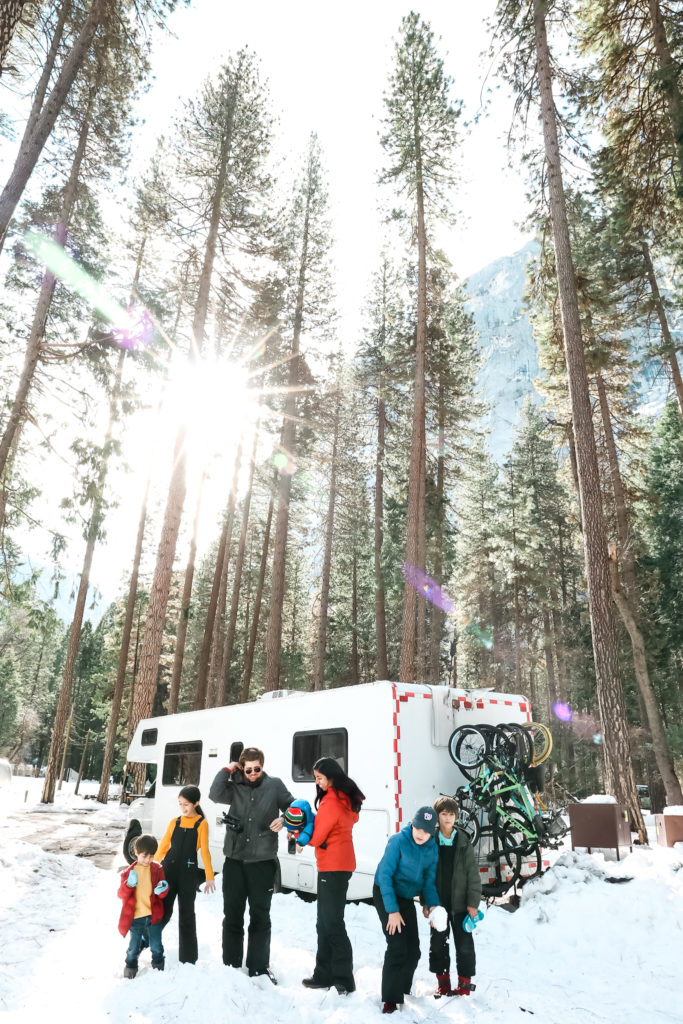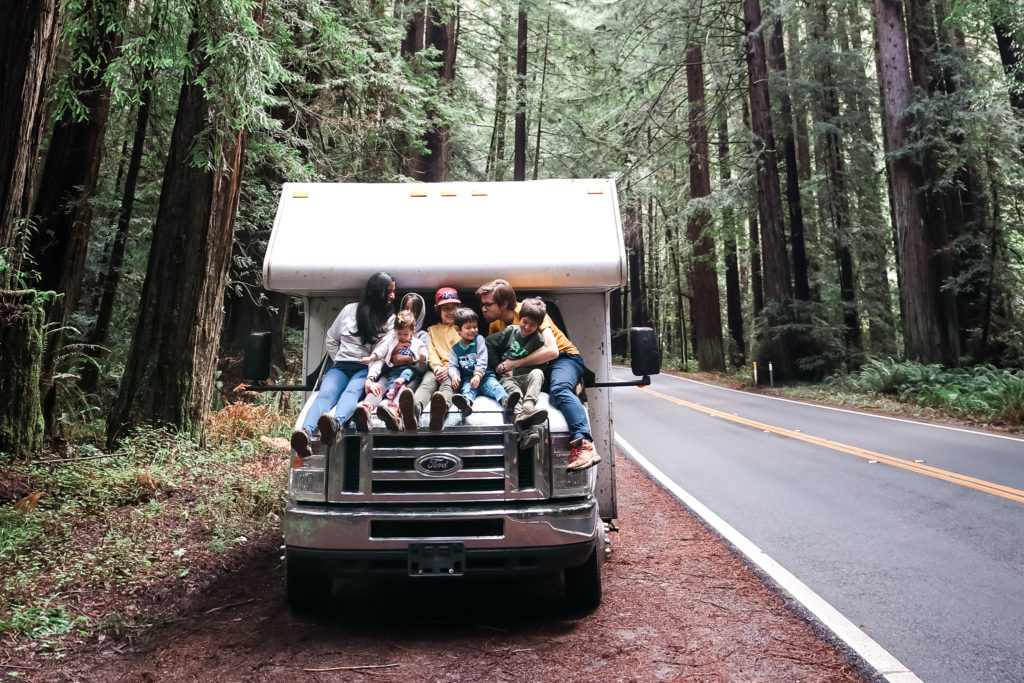This post is sponsored by Camping World. All opinions are my own.
When we first started RVing during the pandemic to go see high-risk family members, we knew working from our RV would be necessary. We needed a reliable internet connection that would allow us to work remotely from our RV while we traveled across the country. But we had ZERO clue how to set up our RV internet and make that happen.
Fast forward to weeks and months of research, when we finally got settled with much more reliable RV wifi options. It definitely took some trial and error to figure out what would work best for our family to create our RV office! But we managed to figure out internet access for our RV that has served us well and allowed us to work remotely from the road.
The two most important parts of our best RV internet options for working from an RV in the US are getting a good signal, and then making sure that signal is as strong and reliable as possible. Here’s how we’ve made those things work, including the products that have been helpful from Camping World and elsewhere. I hope our tips for our RV internet setup are helpful to you, as well!

The Best RV Internet Setup for Working From an RV
Mobile Internet Solution for RV Remote Workers
When you are on the road working from an RV, you’ll use a lot of data! So unlimited data plans for internet in your RV has been necessary for us. Even without streaming videos online over data, working remotely with just a few video calls per day can easily add up to 50gb/month. Paying piecemeal for a data plan can really add up fast so having unlimited RV internet is key. Some carriers may even allow you to update your data plan for a specific time period. Just give them a call when you know you’ll be working from your RV. They may allow you to upgrade to an unlimited cellular data plan for however long you’ll be on the road.
Multiple Options of WIFI for RV Office
Different providers are strong in different areas of the US, so it can be helpful to have more than one RV internet plan options if possible. Google Fi is one plan that automatically draws on the strongest cell phone tower near you regardless of who the provider is. But in our experience, pulling from Google Fi is not quite as strong as having that plan itself. For instance, if you’re pulling from a Verizon tower on Google Fi, it doesn’t seem as strong of an internet connection as having a Verizon RV internet plan. But it can still be useful if, for instance, you only have a T-Mobile cellular data plan. In that case, Google Fi has the ability to pull from both carriers, though perhaps more weakly.
That’s why, when RV traveling with more than one person working, it can make sense to get data plans on different carriers. If you are considering getting a wifi mobile hotspot device, in addition to your current cell phone line, consider a new carrier. That will help diversify your options of using cellular data when you’re in the woods.
Research RV Mobile Internet Signal Strength
Before heading to a campground or RV park, we always like to research the coverage strength for different carrier data plans there to check our level of internet connectivity. Opensignal.com can tell you what your expected cell phone signal will be in a given location based on crowdsourced data. If you’re camping and plan to work remotely, Campendium is one of our favorite RV camping apps. The app itself is free, but paying the $20/year subscription unlocks cell phone data coverage information for your specific carrier at different campgrounds and RV parks.
Mobile Hotspot Device
Some RVers with remote jobs prefer to have a separate mobile hotspot device and plan for internet access. While we’ve found our cellphone data plans to be the most service and cost effective, this post has a bunch of options if you’d like tips for the best internet in an rv with a specific mobile hotspot wi fi device. The top ones they mention are this AT&T one and this Verizon one. This GlocalMe one also has great reviews and is powerful.

Increasing Your RV Wifi Signal Strength with a Cellular Booster
To successfully work from an RV and have the best RV internet signal, we found having a cell signal booster necessary. It has been one of the biggest game-changers for us. Whether an area already has a blazing fast 5G networks or just a very weak signal, a cell booster can amplify it. This makes working remotely easier.
After lots and lots of research, we bought the WeBoost Drive Reach RV (also available here). This can amplify your cell phone speed by 32X. (This post explains why the WeBoost Reach RV is far superior to the older WeBoost Drive X RV.) While there are a number of RV cellular boosters out there, this is one of the strongest. It also works while stationary as well as while driving. It works with multiple carriers simultaneously to give you internet in your RV. That means we don’t need separate boosters for different devices.
We didn’t find the installation to be too tricky. It does need ventilation, so I wouldn’t recommend putting it in a glove box (under a seat has been good for us). WeBoost will also stay on the phone with you while you do the install if you need.
Here are a few other internet boosters we considered:
- Cel-Fi Go X (super powerful but quite expensive and only works for one network at a time)
- SureCall Fusion2Go (compact but seemed to be not quite as powerful based on reviews)
- SureCall N-Range 2.0 Vehicle Signal Booster (inexpensive version but only can be used with one user at a time and only works for #G & 4G)
- Hiboost Travel 4G 2.0 RV
Tips for Making the Most of an RV Internet Signal for Remote Workers
Keep in mind that no RV internet booster will create a cell phone signal. An internet booster will multiply what is already there. So if you truly are in a cell phone deadzone, the booster won’t be able to create a signal for you. But if you can muster even a sliver of signal, the booster can strengthen it for you. Here are some tips for making the most of any RV cell signal that is available.
1. Avoid Data Rush Hours
This may be easier said than done. Even with remote work, not everyone can dictate their work schedules. Still, every cell phone provider experiences “rush hours”. It might seem like everyone is trying to use data at the same time and bandwidth simply will slow down. Peak is typically in the evening hours after dinner, but this obviously varies by hyper-specific location. Every single cell phone tower may have a slightly distinct “rush hour.”
Sending a critical message or file is sometimes impossible during the evening. If that happens, you may be able to send it in the wee hours of the early morning without much competition for that bandwidth. If possible, try to shift your working hours from your RV to off-peak hours to get the best internet signal from your RV.
2. Pick Your Service Level
Yellowstone National Parks’ Old Faithful geyser visitor center has one of the parks rare cell phone towers. We’ve had several phones show a 4G signal there. But don’t be fooled! SO many people draw on that single tower during peak visitation hours/days. So we’ve found it difficult to even send a text message.
Most of today’s phones optimize automatically, but you can sometimes trick your phone into faster speeds during rush hour. You can do this by actually downgrading from 5G to 4G or even 3G. Each of those service levels actually has its own tower. So if everyone is overloading the 5G tower, you may find that the 4G tower will actually offer you faster speeds.
You can check your phone’s settings to see if you can control which tower (5G, 4G or 3G) that it draws data from. Just check in your phone’s “settings” to find out if you can control the “preferred network mode” and select “WCDMA/GSM auto” or manually select 4G or 3G.
3. Consider Topographical Location for the Best RV Wifi Options
Even though we can’t see cell phone data signals, they are still blocked by natural and human-made features. So topography mattersespecially when traveling to National Parks! You’re more likely to get a good signal on top of a mountain than in the bottom of a canyon. If possible, adjust your remote work location to gain either altitude or open space that’s blocked by few trees.
These are some of the best ways to maximize your internet service while working from an RV. And hopefully this will help you minimize the likelihood of dropping an important phone call or missing an important message. But just like home internet can drop, your signal on the road is also based on location, other users, building materials and even the weather around you. Be patient and flexible, and enjoy the journey!











